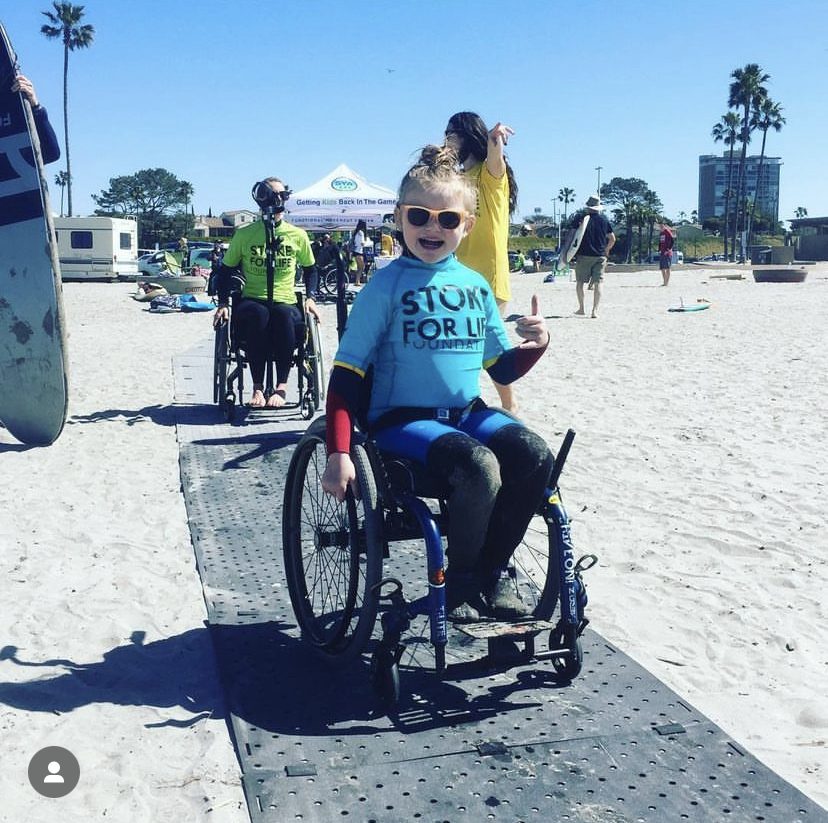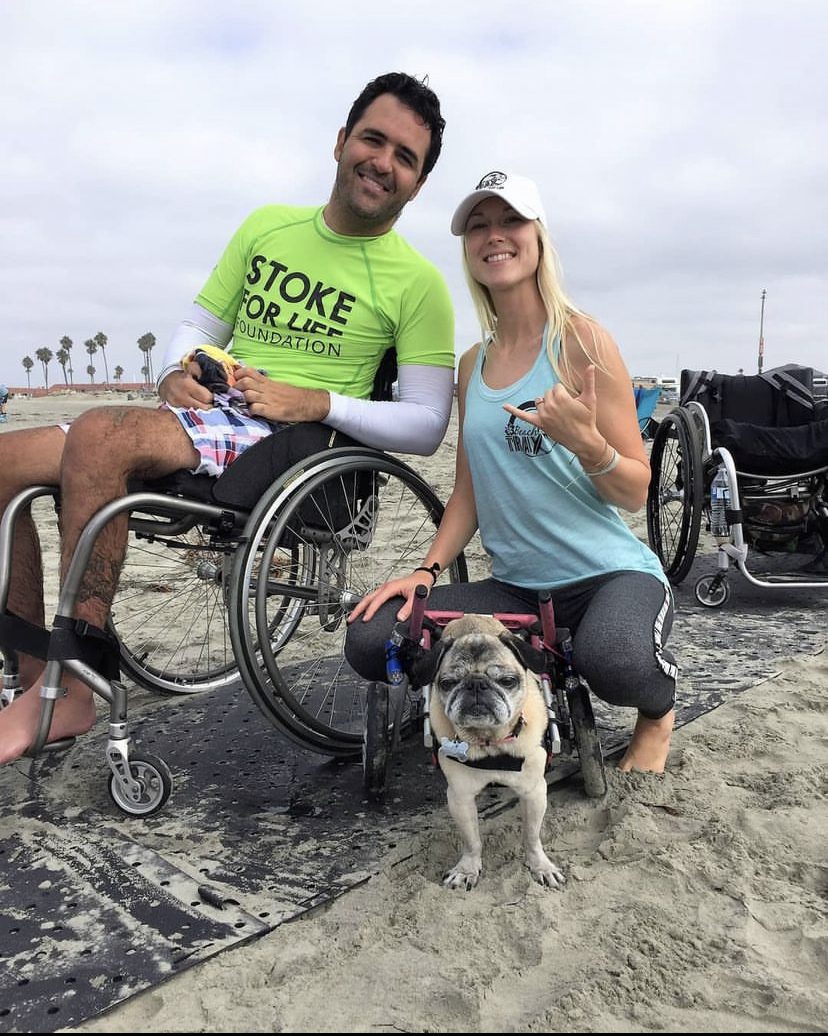In celebration of July being Disability Pride month, we spoke with Kelly Twichel, social impact entrepreneur, assistive tech inventor and CEO of Access Trax who is making a positive impact in the lives of people with mobility issues. She shared with us what drives her passion, what some of her biggest lessons have been, and the advice she gives to anyone creating a business that serves the disability community. As interviewed by Julie Schlossberg.
From Occupational Therapist to Inventor & Entrepreneur
Kelly Twichel (she/her) was first inspired by a challenge that her occupational therapy professor gave her grad school class – make crossing the sand and getting to the ocean more accessible for adaptive surfers. Kelly and her co-founder took on the challenge and after some trips to the hardware store, invented Access Trax, a portable beach mat that allowed people in mobility devices to maneuver across sand. They tested their first iteration of their design with surfers from Stoke for Life Foundation, an organization that brings awareness to the rehabilitative benefits of water sports and also hosts the US Open Adaptive Surfing Championship. Access Trax mats gave independence and dignity to adaptive water sports athletes who sometimes had to be carried or crawl across the sand to the ocean. Hearing from the surfers how the invention made a difference in their lives was the spark that changed the trajectory of Kelly’s career and soon became Access Trax’s mission, “to empower people of all abilities to access the outdoors & recreation.”

Because of their effectiveness and versatility, its usability quickly expanded to a wide range of adaptive sports, outdoor environments, events, and industries – from triathlons to weddings to national parks and even the film industry. Fueled by her life experiences and growing up with her mother having a disability, Kelly launched Access Trax in 2018 and took the brave leap of leaving her full-time occupational therapy job within three years.
Access Trax is an ADA compliant, portable, lightweight, recyclable, outdoor pathway system to make terrains like sand, grass, gravel, and snow accessible for people with physical disabilities. To date, her social impact business has partnered with more than 50 non-profits and has given more than $50,000 in donations and sponsorships. She is both an ally and an innovator and her products are used by families, businesses, and governments in seventeen countries. Access Trax is a patented technology and has been awarded over $135,000 in grant funding. Kelly is inspiring the next generation of entrepreneurs as a speaker and mentor of entrepreneurial students at universities including Harvard, SDSU, and USD.
Adaptive Sports and Assistive Technology are a Game Changer

One powerful and fun way that we can create an inclusive world is through adaptive sports and recreation. Sports and play are universal languages, and all people deserve to have access to them. Adaptive sports (or para sports) is any sport, recreational or competitive, that is modified with equipment or rules to allow for inclusive participation of people with or without physical or mental disabilities. It can also include the support of an able-bodied person such as guides for the visually impaired track & field athletes. There is an adaptive version of most all sports plus some new ones that have been created. Whether it’s wheelchair tennis or adaptive surfing, a local club or Team USA, organizations around the country and world are offering people of all ages and abilities the opportunities to learn and play which are good for the mind, body, and spirit while also creating a much needed sense of community and belonging. Assistive technology plays an important role in making this possible; it is the science and engineering that creates equipment, software, and products that can help people with or without disabilities function easier and on a more even playing field, both in life and in sports and recreation. These technologies are a familiar part of our everyday lives for many people – closed captioning, speech-to-text, and screen magnification to name a few. In adaptive sports prosthetic blades help people with amputations walk, and run, wheelchairs can be used for racing or playing basketball, and mobility mats are a game-changing technology for adaptive surfers, triathletes, and anyone with mobility issues accessing the outdoors.
There are an estimated 61 million people in the US living with disabilities and 1.3 billion people (or 1 in every 6 people) in the world, making it the largest minority group on Earth. Disabilities are both visible and invisible and can include physical, sensory, cognitive, and intellectual impairments, mental illnesses, and chronic diseases. Examples of visible disabilities are mobility impairments such as spinal cord injuries, amputations, cerebral palsy, muscular dystrophy, visual impairments, dwarfism, neurological conditions, or other injuries and health conditions. Harder to recognize are invisible disabilities such as intellectual and learning, mental health conditions, hearing impairments, chronic pain disorders, autism spectrum disorder, traumatic brain injuries, ADHD, and more. Judgments, misconceptions, and ableism can be painful and discriminatory for a person whether one’s disabilities can be seen or not, and thus difficult to advocate for oneself, which is why it is essential that as a society we create the most equitable, accessible and inclusive opportunities for everyone’s diverse abilities.
 Connect with Kelly Twichel and Learn More about Access Trax
Connect with Kelly Twichel and Learn More about Access Trax
Connect: LinkedIn
Learn More: Access Trax Website
Subscribe: Sign up for the Newsletter
Follow: Instagram
Experience: US Open Adaptive Surfing Championship: September 6-10, 2023
Here are some of Kelly’s favorite entrepreneurial resources:
How I Built This with Guy Raz Podcast
TheEntrepreneuREALMindset on Instagram
The EntrepreneuREAL Mindset Facebook Group
If you need assistance with ensuring your website and digital assets are accessible to all and ADA compliant, Hera Hub has a website and digital accessibility guru that can support you.





